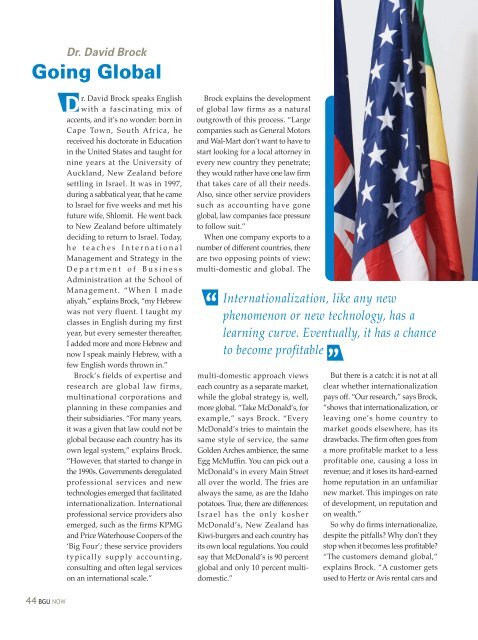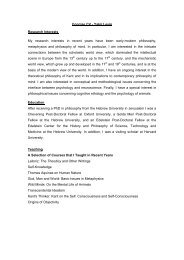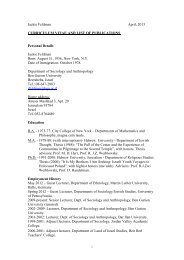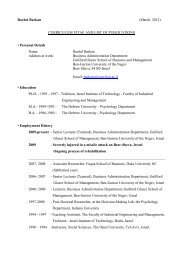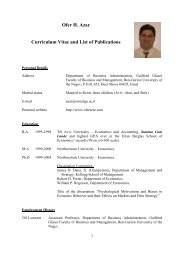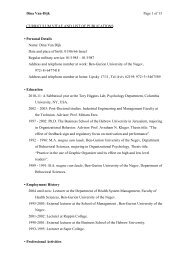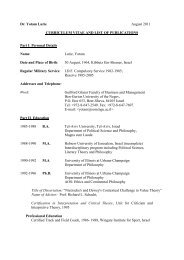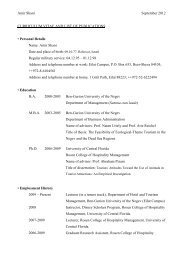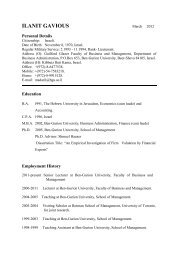cover 2006
cover 2006
cover 2006
Create successful ePaper yourself
Turn your PDF publications into a flip-book with our unique Google optimized e-Paper software.
Dr. David Brock<br />
Going Global<br />
44 BGU NOW<br />
D<br />
r. David Brock speaks English<br />
with a fascinating mix of<br />
accents, and it’s no wonder: born in<br />
Cape Town, South Africa, he<br />
received his doctorate in Education<br />
in the United States and taught for<br />
nine years at the University of<br />
Auckland, New Zealand before<br />
settling in Israel. It was in 1997,<br />
during a sabbatical year, that he came<br />
to Israel for five weeks and met his<br />
future wife, Shlomit. He went back<br />
to New Zealand before ultimately<br />
deciding to return to Israel. Today,<br />
he teaches International<br />
Management and Strategy in the<br />
Department of Business<br />
Administration at the School of<br />
Management. “When I made<br />
aliyah,” explains Brock, “my Hebrew<br />
was not very fluent. I taught my<br />
classes in English during my first<br />
year, but every semester thereafter,<br />
I added more and more Hebrew and<br />
now I speak mainly Hebrew, with a<br />
few English words thrown in.”<br />
Brock’s fields of expertise and<br />
research are global law firms,<br />
multinational corporations and<br />
planning in these companies and<br />
their subsidiaries. “For many years,<br />
it was a given that law could not be<br />
global because each country has its<br />
own legal system,” explains Brock.<br />
“However, that started to change in<br />
the 1990s. Governments deregulated<br />
professional services and new<br />
technologies emerged that facilitated<br />
internationalization. International<br />
professional service providers also<br />
emerged, such as the firms KPMG<br />
and Price Waterhouse Coopers of the<br />
‘Big Four’; these service providers<br />
typically supply accounting,<br />
consulting and often legal services<br />
on an international scale.”<br />
Brock explains the development<br />
of global law firms as a natural<br />
outgrowth of this process. “Large<br />
companies such as General Motors<br />
and Wal-Mart don’t want to have to<br />
start looking for a local attorney in<br />
every new country they penetrate;<br />
they would rather have one law firm<br />
that takes care of all their needs.<br />
Also, since other service providers<br />
such as accounting have gone<br />
global, law companies face pressure<br />
to follow suit.”<br />
When one company exports to a<br />
number of different countries, there<br />
are two opposing points of view:<br />
multi-domestic and global. The<br />
Internationalization, like any new<br />
phenomenon or new technology, has a<br />
learning curve. Eventually, it has a chance<br />
to become profitable<br />
multi-domestic approach views<br />
each country as a separate market,<br />
while the global strategy is, well,<br />
more global. “Take McDonald’s, for<br />
example,” says Brock. “Every<br />
McDonald’s tries to maintain the<br />
same style of service, the same<br />
Golden Arches ambience, the same<br />
Egg McMuffin. You can pick out a<br />
McDonald’s in every Main Street<br />
all over the world. The fries are<br />
always the same, as are the Idaho<br />
potatoes. True, there are differences:<br />
Israel has the only kosher<br />
McDonald’s, New Zealand has<br />
Kiwi-burgers and each country has<br />
its own local regulations. You could<br />
say that McDonald’s is 90 percent<br />
global and only 10 percent multidomestic.”<br />
But there is a catch: it is not at all<br />
clear whether internationalization<br />
pays off. “Our research,” says Brock,<br />
“shows that internationalization, or<br />
leaving one’s home country to<br />
market goods elsewhere, has its<br />
drawbacks. The firm often goes from<br />
a more profitable market to a less<br />
profitable one, causing a loss in<br />
revenue; and it loses its hard-earned<br />
home reputation in an unfamiliar<br />
new market. This impinges on rate<br />
of development, on reputation and<br />
on wealth.”<br />
So why do firms internationalize,<br />
despite the pitfalls? Why don't they<br />
stop when it becomes less profitable?<br />
“The customers demand global,”<br />
explains Brock. “A customer gets<br />
used to Hertz or Avis rental cars and


